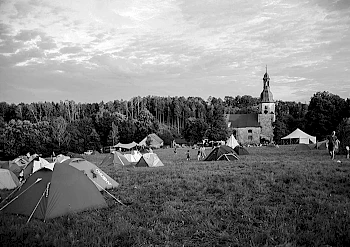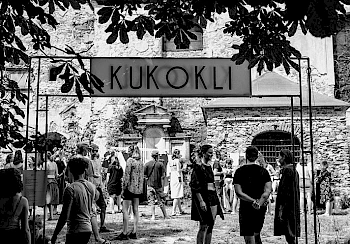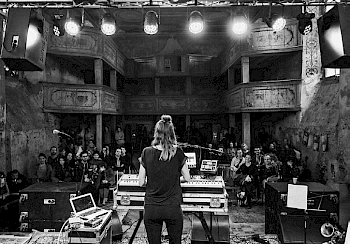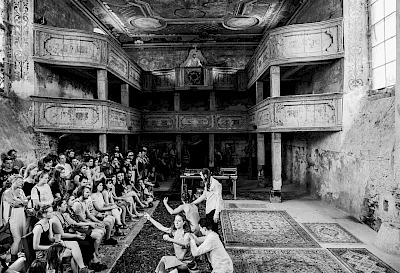Miriam Macnerová Vilímová and Johana Urbanová
How did you meet and what brought you to the place where you organize the KUKOKLI festival?
Miriam : We met in an English course after high school. That year, Johanka applied for the production course at damu, I applied for choreography at hamu, and I did one of the choreographies in church. We thought it would be good to do an event right in a church. First we held the virtually zeroth year in Prague. But then we thought that it would be more interesting to revive a place that has fallen into disrepair, that is not very well known and for which it is difficult to get funding. So we searched the internet. We had several tips, and one of them was the Church of the Visitation of the Virgin Mary in Ober Wittig. So we went there and we immediately clicked. We really enjoyed it, we sat down with those responsible at the local church and could see that the festival would fit in well there.
Did you have any other tips or what criteria did you use to choose the location?
Johana : We had a few other tips. And actually at the beginning we thought that it would be nice if the place had a meadow around it, a forest, so that it wasn't in the very center of the action, so that it wouldn't bother the residents who might not agree with it or an event like that not want in their neighborhood. We had about two or three other churches. But it was also important for us that it was a reasonable distance from Prague. The idea is that we want to revive more of these churches, so we still have them in the drawer and maybe one day we will do kukokli in other places too.
Can you say something about the first year — how did the locals perceive your initiative?
Miriam : Little by little we tried to get to know the locals somehow. It wasn't easy because we both come from Prague. We send them an invitation with the program to their mailbox every year. We try to show them that we don't want to disturb the place, but rather enhance it culturally and that we are open to them coming, that it is not an event for Praguers but for everyone. Our idea is also to connect people - to bring people from the entire Reichenberg region together. The first year there were quite a few locals, around twenty, which is good considering how small the village is. They looked at it and of course were a little suspicious because it was a strange event with strange people. But I think it gets better every year.
Johana : This year it was very noticeable that people came who were already used to it. And over time we have also come to understand that we simply don't make noise or do things that could be annoying. Nobody has ever complained, which we think is very nice. Again, we're not kidding ourselves, it's a festival, there's always music playing, a certain number of people come... But we managed it so that it doesn't bother anyone.
Miriam : Especially the first time, we tried to be very modest so that we didn't disturb the environment. And everyone said that they didn't know we were there and that it was very clean after us. We tried really hard to clean up so there wasn't any rubbish left anywhere. Yes, every year we prepare the locals that the event will be a little bigger and maybe more people will come so that they are not afraid. But they've gotten used to it and respect it. They know it's not a crazy event, but rather a friendly one. Johana: We also try to accommodate them - residents of Ober Wittig have free entry and residents of Kratzau have a discount. We want them to come! And that's why we do it this way, so that they might also feel like supporting the church and seeing it as their own, since it is, after all, where they live.
In addition to hosting the festival, you probably also managed to draw attention to the condition of the church as a landmark. Has anyone joined you to do physical work on the church and its surroundings?
Johana : To be honest, we probably haven't generated a huge wave of interest in this regard. I think we contribute by holding an event that is visible. If you apply for funding for such a monument, you would need hundreds of thousands, if not millions, of crowns to do anything with it. The festival is a strong argument for putting money into the church because it can be used for cultural events. Our event has results, photos, videos so you have something to show for it. I think it helps the church primarily as PR.
Miriam : I also think that the media presence helped a lot. If someone finds the church, it will be through our festival. We ourselves receive financial support so that the ministry also knows that the event is taking place there, what it looks like and how it works. I think it has brought quite a lot to the town of Kratzau, to which Ober Wittig belongs. This also makes Kratzau more open to financing. They are open to cultural events that take place there, which was also the goal of the administrators who look after our church, and the Catholic Church is also open to it. As for the locals, I think they have a slightly better relationship with the church. I have the impression that it is a bit ambivalent. “Yes, we are happy, it is our monument here, a kind of landmark of Ober Wittig.” But they are not completely open to this space. And as he becomes more visible, her relationship with him also improves.
Johana : We know from the administrators of the church, Mr. and Mrs. Kačani, that before they came there, there were boys skateboarding and spraying graffiti there. It was totally grotesque! There are baroque frescoes and graffiti in between and “great world love” engraved in the middle! In a way it's fascinating. Actually, I think it's beautiful, but at the same time frightening. If the administrators had not intervened, the church would be in God knows what condition today. There is also a rumor that the church was robbed. It is very likely that the locals also played a role in this. Maybe someone has a bad conscience...

After a few years and with a certain amount of experience, do you know something today that you didn't know at the beginning? Would you do anything differently today?
Johana : Maybe not be afraid to communicate more confidently, both with the authorities and with the locals. We were very worried about how they would find us or the event. In the four years we've been there we've made a name for ourselves, and I think a positive one. You should also inform them about the city and perhaps ask for financial help.
Miriam : That's true, don't be afraid to get more involved.
Johana : And then of course there are a lot of technical things. Like the first year when we shut down the internet in the entire village. If we had known this in advance, we would have paid attention.
Miriam : We also think a lot about ensuring that the whole thing is compatible with the “spirit” of the place. We're still trying to manage the whole thing somehow so that it doesn't become a mass event.
You say that more visitors are constantly coming - which target group do you have in mind?
Miriam : Everyone asks us that, it's part of every project proposal. Our most common answer is that we don't have a target audience, and we believe that's a good thing. We want children and seniors to come because our grandmothers were there in the zeroth grade. Even now that we have a really big festival concept, we really try to appeal to everyone and make the program varied. Of course, now it's no longer people who are, for example, seventy years old who come, but people who are our parents' age, maybe fifty-five or sixty years old, and they are enthusiastic.
Johana : The target audience has no age limit, it's just people who like good programming, good music and culture, and who also care about the atmosphere, an intimate environment in which you feel comfortable. I have a lot of friends who come there and actually hate festivals. They don't like being around people, they hate camping. But here they say it's a festival they like to go to.
Do you have a recipe for how to avoid turning the festival into a mass event and how to deal with the media coverage that comes with financial and other support?
Johana : We have a pre-sale on GoOut and are only giving away a limited number of tickets there. That's what makes the festival what it is. It's an intimate atmosphere and there aren't that many people there. But logically it grows. People come by themselves, write and ask when kukokli takes place. So we want to limit that with the tickets, but at the same time we don't want to make them overpriced.

Did you have any inspiration at the beginning, perhaps from abroad?
Johana : Not really, we like both festivals and have seen a lot in the Czech Republic. We thought about what we like and don't like and what we want to do differently. We work very intuitively. We put everything together according to our own taste. We try to make sure that there is a program for children, a program that people can dance to and at the same time some calm music.
Have you had any particular encounters — and I don't mean with a specific age group, but with a specific person — that were particularly enlightening or inspiring for you?
Miriam : Absolutely, we meet someone like that every time! For me, the encounter with the displaced Germans was very powerful. They live in Zittau, so they speak partly Czech and partly German. It was incredibly inspiring when they came up to us and started talking to us. And now we see them there regularly.
Johana : Or someone comes and says that they grew up there or that they were at a wedding there. It's very nice to hear stories like this. These are the visitors. And as far as the bands go, it's more like the ones we meet by chance, invite them and find that it works. And then they might stay there for the rest of the festival. Miriam: It's always a nice sign when you write to us and ask if you can play there again next year. But we have a rule that we don't take the same band every year, we want the program to be different every time. But it's nice to hear that they enjoyed playing there, that there was a good atmosphere, even if the room is very demanding, the acoustics in the church are not particularly good. There is a flat wooden ceiling, which helps a little, but they can barely hear themselves when they play.

Why is your festival actually called kukokli?
Johana : We came up with the name shortly before when we submitted the project application that year and it was “Cultural Event in the Church”. We came up with the abbreviation “Culture — Church — Kliment” because it took place in St. Clement's Church in Prague, so simply kukokli. But of course what happens is that people mispronounce it, no one remembers it, the name is actually terrible. But at the same time, he's so funny that he resonates in people's minds when they remember him. So at the end of the day, I stand by it and would never want to change it.
Miriam : Me neither. So now it is no longer “Culture - Church - Kliment”, but “Culture - Church - Klid”, i.e. calm, which is terribly apt.
The photos radiate calm. Do you personally deal with spiritual topics as part of the festival?
Johana : I personally am not a follower of a church, but I am a believer, spirituality is the basis of my life, both privately and professionally. This is also reflected in kukokli. Simply by the fact that it is a consecrated church and by weighing up what we can and cannot allow ourselves there. If I compare that, for example, with my production colleagues who just do bigger things, then it could never work. They would never have respect for the place because they don't really feel the spirituality. So I think it's fundamental. And it is also our intuition.
Miriam : I am a believer, I belong to the Evangelical Church of the Bohemian Brothers, which is why our zeroth year took place in the community I attend. Johanka says that each of us has a slightly different understanding of faith, but together we are very harmonious and this is reflected in our lifestyle. Just like in the organization of the event: we try to follow the rules and we do it intuitively. We have a bigger team now, and we're trying to explain that this idea is important to us.
You organize an event at a place with German-Czech history. Is the topic of coming to terms with the past somehow tangible for you?
Miriam : We had a lot to do with it, especially in the first year. We wanted to embed that as much as possible and connect with organizations. We always have a lecture by Victor Kačani (the manager) who talks about the place and the area. I have to admit that we are focusing on other things now, but we are still open to it. We say to ourselves every year that we would like to establish German-Czech cooperation so that the location also plays a larger role.
Johana : Last year we were supposed to have a band from Germany, unfortunately that didn't work out because of Covid, but this year we're approaching them again. This way we could expand the audience even further. We still have to work on that.
Miriam : We would like to do PR on the German side too, but it is difficult to implement that. It would be great if there were more connections. Last year we worked with two producers who approached us precisely because we were doing kukokli in the border area and they themselves were also doing events in the border area. But because of Covid it didn't work...

From the German-Czech environment, we are used to the fact that the modern chapter of our history represents a kind of detonator for relations... Where do you think we stand?
Johana : In Prague I think that German-Czech relations as an issue have already been settled. But as far as the border areas and the Sudetenland are concerned, I think it is still an issue there. And in fact, everyone we spoke to there felt the need to somehow vent, to talk about it.
Miriam : It seems to me that you can really feel that in the atmosphere in the Sudetenland. For example, a lady who used to live there came. And I've had several conversations about it there, either with her or with someone else who no longer lives there. We always talk about it in our church because the space invites it. People meet there, which makes us happy. The conversation is triggered by the event, which one might say is actually unrelated. But it's connected because the place connects them. And this church in particular has been quite heavily influenced by this history.
How can you tell that the “Sudeten issue” has not yet been resolved there and is still sensitive?
Johana : I believe that people have the need to vent. I feel like younger people feel the need to say, "Okay, that's what happened here, but let's move on so it doesn't affect the next generation." The people it concerns most are in theirs 50s and 60s. You get lost in kukokli for a while and feel the need to open up this topic.
If you try to imagine yourself fifty or seventy years in the future, what will the festival site look like? What would you like there?
Miriam : I would like to see the church preserved and restored to its original form as much as possible. And I wish it would continue to be used for cultural events. That the Catholic Church continues to support these activities and not just the masses for the Catholic faithful. I wish it would stay open. I have the impression that it works, people are trying, they are very committed. The residents have become active and I hope it stays that way. And I also hope that people don't move away, but stay. Ober Wittig has a strategically good location, it's just a short walk to Reichenberg, and it's just beautiful there, beautiful nature, peace and quiet. I hope that it stays that way and that it opens up even more to the world. And that the residents are more open.
Johana : I can imagine that the church will then be restored, but actually I wouldn't like it at all. It's paradoxical... The charm of the place is that the church is a little run down, which creates an interesting atmosphere. So I think it would be great if they restored it, but...
Miriam : ...that it doesn't go back to its original state, which may sound mean, but I think it could help to continue to raise awareness of the problems with monuments.
Johana : At the same time, I can imagine that kukokli will still be around in fifty years, even if someone else might be directing it. I believe it will become a tradition that we may be able to pass on to others. Or maybe one of the locals decides they want to keep the event going.
